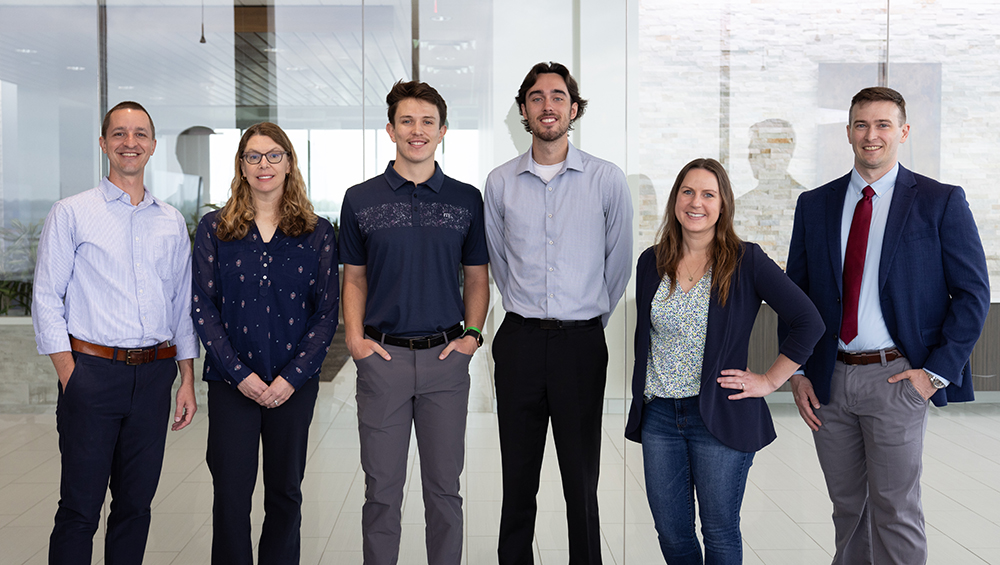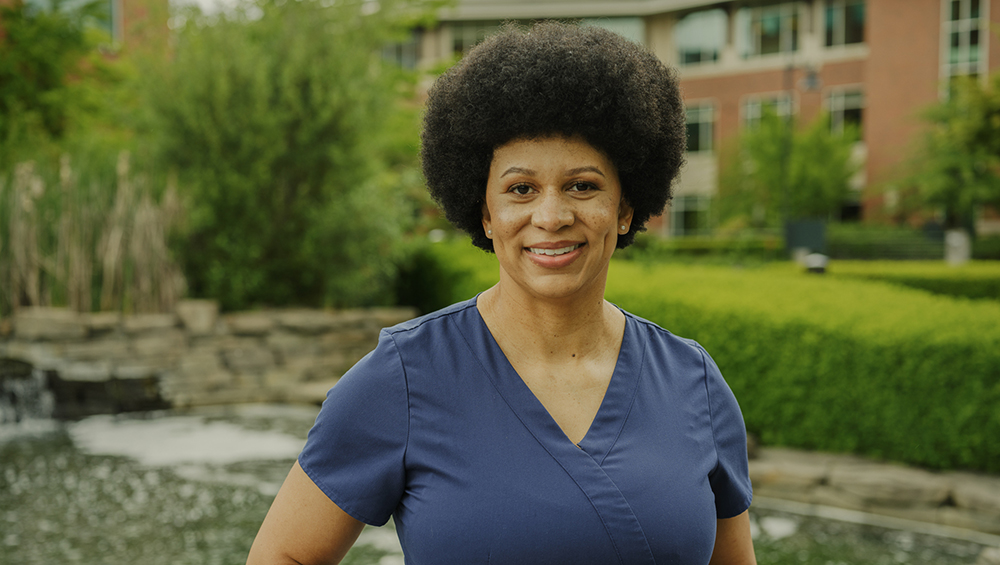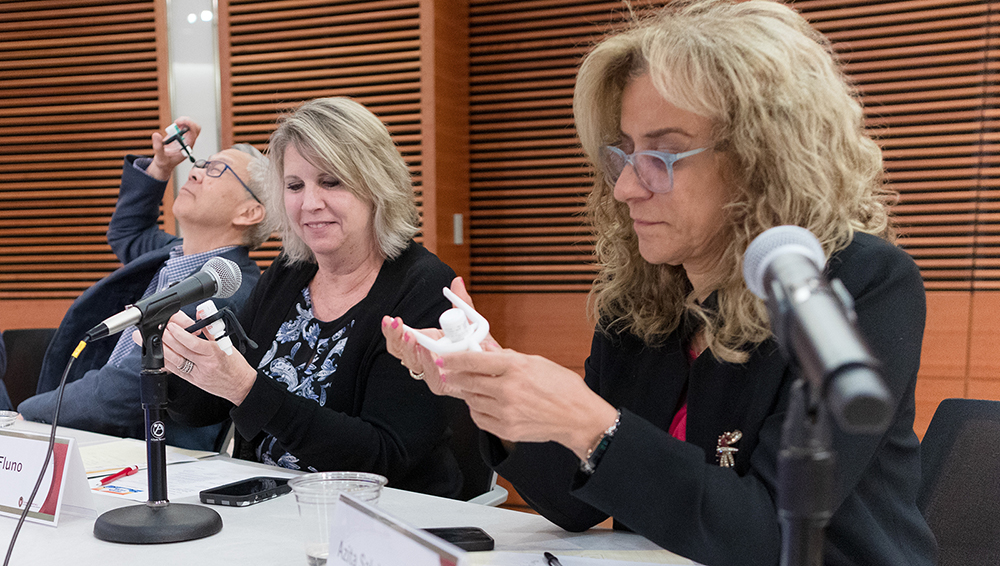
Teams of PharmD and biomedical engineering students present innovative health solutions to a panel of School of Pharmacy alumni judges
By Paige Haehlke
A one-month supply of glaucoma eye drops can cost $350 — a high expense for older adults, the most likely demographic to develop glaucoma, many of whom are living on a fixed income. And these costs can compound even more rapidly if the drops aren’t properly administered, which research shows is the case for 91 percent of patients.
“Many patients can find them very difficult to use. They can find that it’s hard to administer a single drop from the tiny plastic bottles,” says Ryan Smith, third-year PharmD student at the University of Wisconsin–Madison School of Pharmacy. “Oftentimes, patients have trouble putting the eye drops exactly in their eye, and even if they do, they can likely administer more drops than they need, and as pharmacists know, that can lead to many systemic side effects.”
“I love seeing the next generation of talent offering ways of improving therapy and health care for our patients.”
—Azita Saleki-Gerhardt
This is just part of the product pitch that Smith delivered in the School of Pharmacy’s 2024 SHARx Tank, alongside two other student groups. Since 2018, the SHARx Tank has been giving the School’s student pharmacists a platform to develop and present entrepreneurial ideas, receiving feedback on how to improve their ideas from a panel of influential alumni judges with extensive experience in pharmacy and the pharmaceutical industry.
This year’s judges were Brent Eberle (BS ’98), senior vice president and chief pharmacy officer at Navitus Health Solutions; Azita Saleki-Gerhardt (BS ’88, MS ’91, PhD ’93), executive vice president and chief operations officer at AbbVie; Deb Fluno (BS ’87), regional director of pharmacy operations and support services at Cardinal Health; and Roger Tung (PhD ’87), founder of Concert Pharmaceuticals.
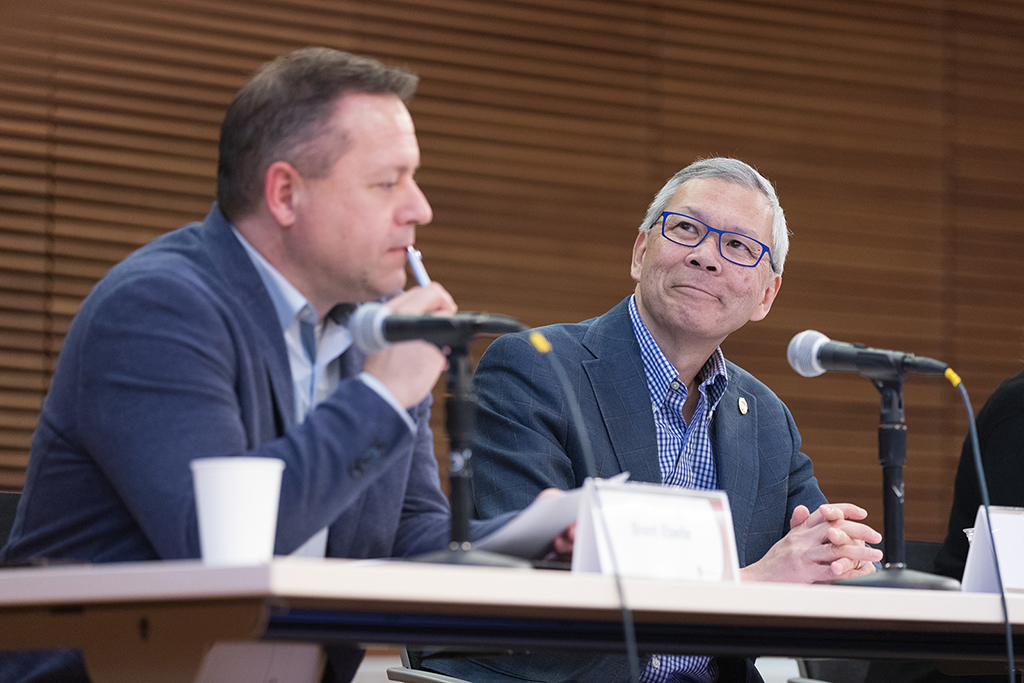
“It’s great to see the creative mind of our students applying fundamentals they learn to address a challenge through innovation,” says Saleki-Gerhardt, who has served as a SHARx Tank judge since the program’s inception. “I love seeing the next generation of talent offering ways of improving therapy and health care for our patients.”
Smith’s group — which leverages the combined expertise of biomedical engineering and pharmacy students — earned the first-place prize of a $3,500 scholarship, funded by alum George Zorich (BS ’78), who helped launch the program in collaboration with Beth Martin (BS ’90, MS ’03, PhD ’06), chair of the Pharmacy Practice and Translational Research Division and assistant dean for Teaching and Learning.
“I think sometimes people associate learning with what is taught in class or a structured setting, but the reality is, how you use your knowledge and experience to address a challenge is an even bigger and more rewarding step in learning that, frankly, better prepares them for their careers,” says Zorich, CEO and chairman of Nevakar, Inc. “This competition challenges students to do just that.”
Improving eye drop administration
The winning idea — pitched by Smith and biomedical engineering students Eva Coughlin, Kasia Klotz, Jenna Krause, Tevis Linser, Anabelle Olson, and Thomas Kriewaldt — was an innovative eyedrop assistant called MyDropper.
MyDropper aims to improve the experience of administering eye drops, particularly for those with dexterity issues, such as older adults.
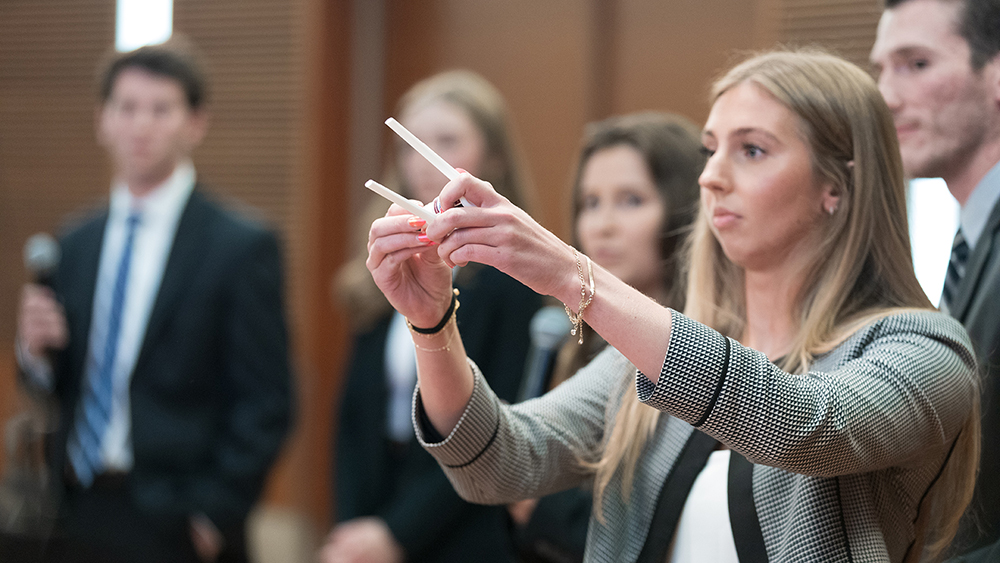
Smith observed patients struggling to properly administer their eyedrops while working in a community pharmacy and partnered with biomedical engineering students to bring MyDropper to life. The device, which comes in two sizes for smaller and larger eyedrop bottles, braces against the nose or forehead, providing stability, uniform dosing, and proper placement while preventing contamination.
“Patients can get their money’s worth of their medication, and it helps them avoid having to pay expensive out-of-pocket costs if insurance doesn’t cover the medication or early refills,” says Smith.
Teamwork between Smith and the biomedical engineering students allowed for the creation of a device that tackles not just one, but all faults of regular eye drop bottles.
“Cross collaboration between students of different disciplines challenges both groups to think outside of the box and offer a richer solution to the problem,” says Saleki-Gerhardt. “This group did just that: proposing a solution to an adherence to therapy issue through creative engineering that offers an opportunity to improve current market offerings.”
The group is currently working on obtaining a patent for MyDropper and hopes to eventually develop it and get it into patients’ hands.
Revolutionizing monitoring of complex patients
Another student team set their sights on improving outcomes for cancer patients by closing a gap in monitoring that can lead to non-adherence, exacerbation of symptoms, and hospitalization.
Third-year PharmD student John Lilek and fourth-year PharmD students Mohamed Mohamed and Steven Do created Quick Rxsponse: a web app that allows patients to check in after each dose of their medication, tracking their adherence and reporting any side effects they’re experiencing.
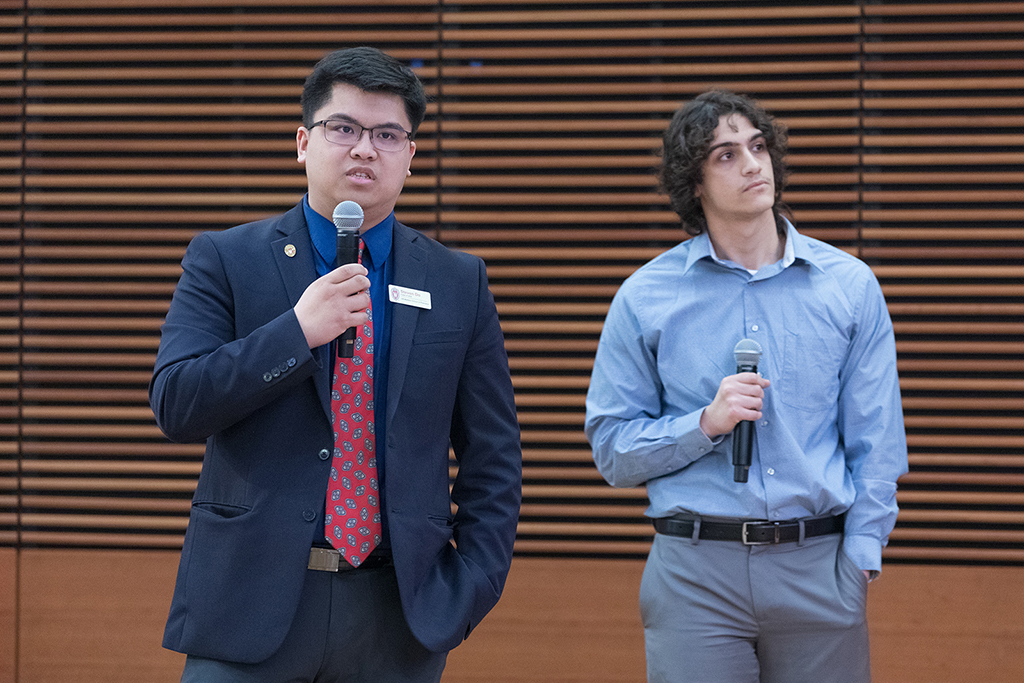
“When patients are able to self-monitor and self-report side effects, that means more timely responses from their providers,” says Mohamed. “It also hopefully leads to better adherence to their medications and thus better disease outcomes.”
The data helps providers make informed decisions with patients about their care and adjust medications to help manage side effects. And for specialty pharmacies, the data from Quick Rxsponse can be used for accreditation purposes to show that they are managing patients correctly.
Do’s passion for Quick Rxsponse stems from having family members who use oncology medications experiencing side effects that they aren’t aware should be treated.
“Someone monitoring a patient’s medications is really psychologically beneficial to them,” says Do. “Then they’re not at home, living on their own island, just hoping the medication works.”
The group won the second-place scholarship of $1,500, which they will use to refine Quick Rxsponse and incorporate the judges’ feedback, such as adding push notifications to remind patients to track their doses. They hope to bring the revamped product back to the next SHARx Tank event with the ultimate goal of bringing it to market.
Minimizing jet lag for long-haul travelers
The final product — created by second-year PharmD students Maite Zapata, Jenna VandeHey, and Alexander Weida, and third-year PharmD student Theo Buna — aims to address jet lag for travelers who traverse two or more time zones: Melagum.
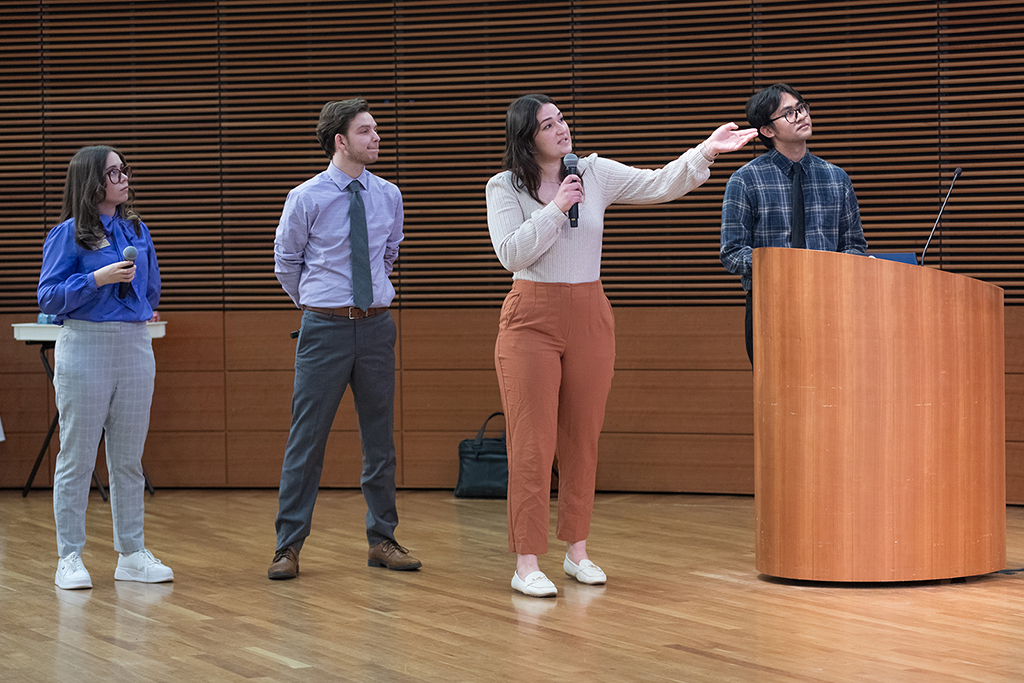
One pack of Melagum contains eight pieces of melatonin-infused gum, enough for two trips based on findings that melatonin treats jet lag when taken for four consecutive days. Melatonin is already available in several dosage forms, such as tablets and gummies, Zapata says. But it’s not yet offered in a form that is commonly carried around by travelers: chewing gum.
“Melagum is an appealing product as many already use melatonin as a sleeping aid,” says Zapata. “Yet, this product offers many benefits in comparison to traditional melatonin, such as portability, pleasant taste, and trackable packaging and therapy.”
The team found the SHARx Tank experience valuable in exploring new skill sets, including marketing, public speaking, and entrepreneurship.
“SHARx Tank is a unique experience that helps us evaluate our own personal opportunities for growth,” says Zapata. “It encourages us to think outside the box.”
Entrepreneurship and the future
Bringing business and entrepreneurial teachings to the School of Pharmacy helps students widen their skillsets and has resulted in improved pitches.
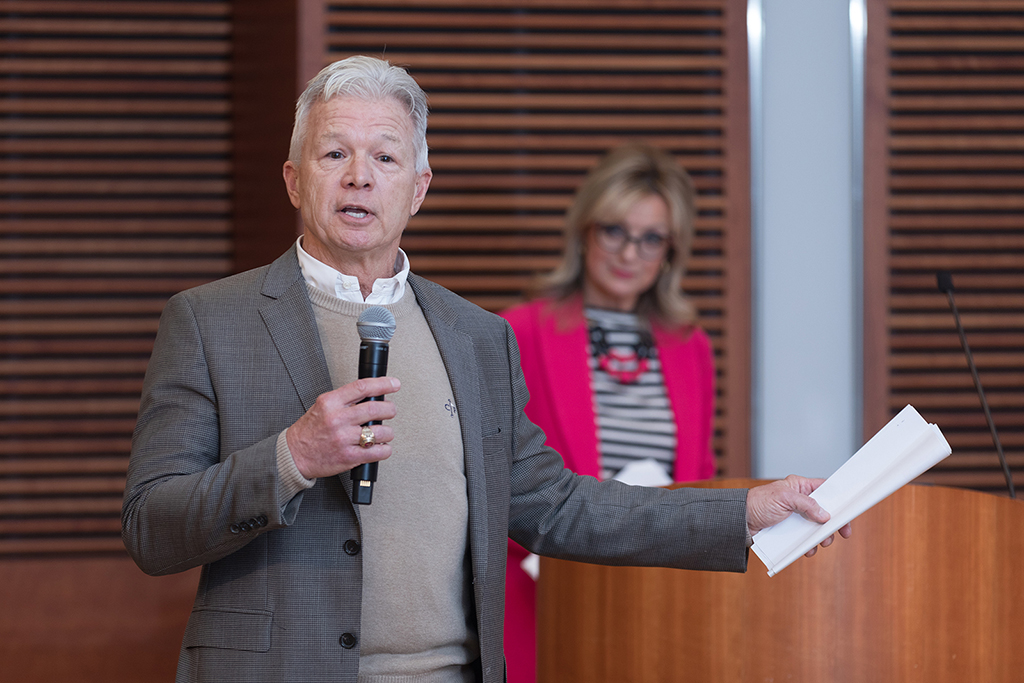
“Student engagement in the business model component of SHARx Tank has increased over the years,” says Martin. “It seems that the students who have aligned with the Operations and Technology Management Named Option Program have more of a business mindset and grasp the ideas of building out a model much quicker than the first couple years of our competition.”
In the future, Zorich hopes to open the program up to other areas of study, like computer science and nursing. Biomedical engineering students were added to the program last year.
“The addition of biomedical engineering assisted in giving a boost to innovation,” says Zorich. “There are other schools of pharmacy who have developed their own shark tank events, but I guarantee ours is far more evolved and productive. This type of cross-campus collaboration, resulting in an amazing idea, differentiates us and highlights the unparalleled opportunities here at the UW.”
